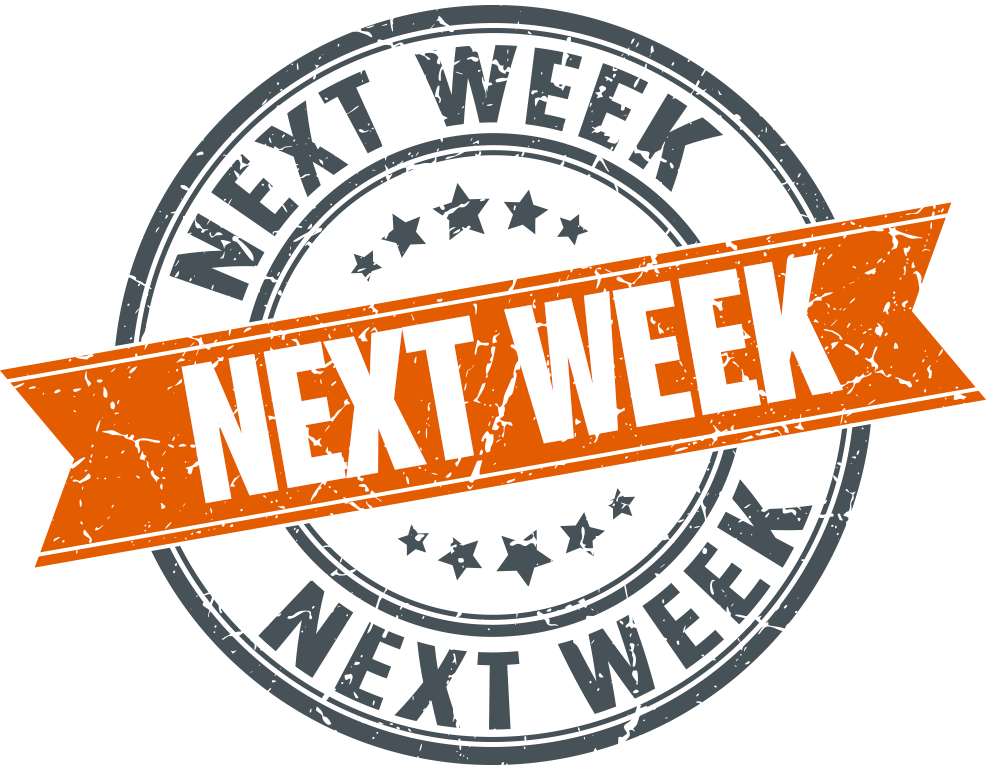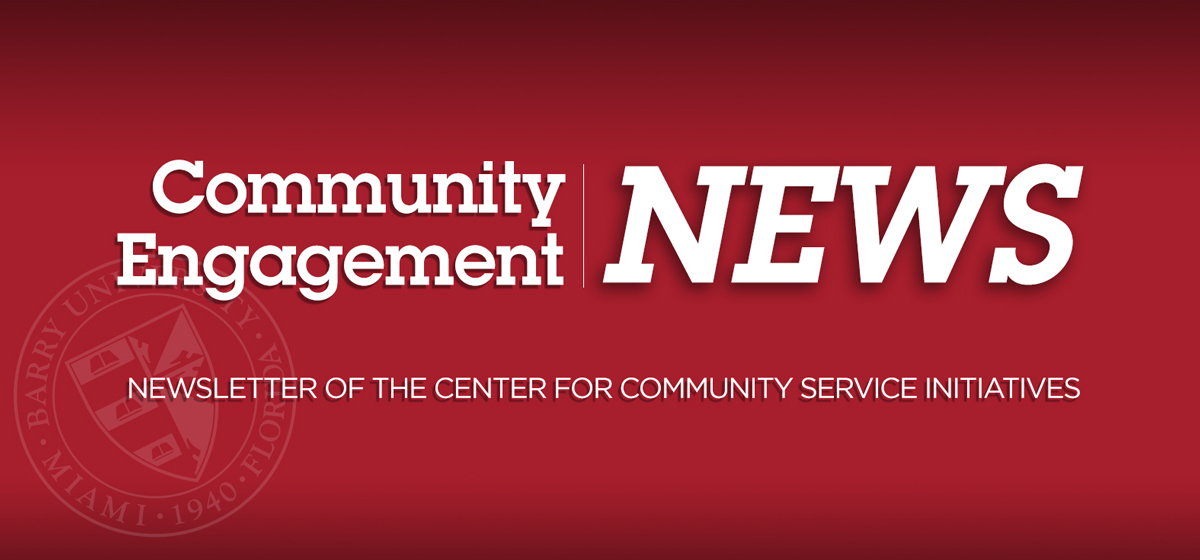January 11, 2021
IN THIS ISSUE
- Students Tackle Social Issues Through Service-Learning and Civic Engagement Projects
- Deadline for Submission of Community Engagement Award Nominations is Fast Approaching
- Proposals for Presentations at Community Engagement Symposium Should be Submitted by January 29
- Interested Faculty Should Apply for the Community-Based Research Incentive by February 1
- Social Work Students Make a Difference in the Community, Reflect on Their Service
Students Tackle Social Issues Through Service-Learning and Civic Engagement Projects
Projects make positive impact on community

•••
After attending PACT’s annual meeting, a group of students sent emails to City of Miami Gardens Mayor Rodney Harris (left) and Miami-Dade County Commissioner Keon Hardemon, advocating support for the implementation of an anti-gun violence intervention.
•••

A group of Barry students recently identified online housing ads and brought them to the attention of a community agency to be investigated for possible discrimination. Meanwhile, another group of students launched a social media campaign to debunk myths about refugees.
The students tackled social issues as they engaged in projects required for the completion of service-learning and civic engagement (SLCE) modules.
Housing Opportunities Project for Excellence—widely known as HOPE, Inc.—is the agency to which students turned over copies of the ads that seemed to reflect housing discrimination. Advocating fair housing, students also sent emails to elected officials, seeking their support of the suggested increase in the month-to-month tenancy termination period from 15 days to 30 days in Miami-Dade County.
In addition, the students identified venues for potential HOPE Inc. workshops focused on the provisions of the Fair Housing Act and the agency’s mission to promote equal housing opportunities.
Social work students Sharaya Lambert and Jennie Iudice appreciated HOPE, Inc.’s strategy to combat housing discrimination in Miami-Dade and Broward counties. As they noted in a presentation during the School of Social Work Service-Learning Symposium last month, the three-tiered strategy consists of private enforcement, education/outreach, and counseling.
“Debunking Myths About Refugees” was the brainchild of a student leader who came to the United States as a refugee. Joseph Minani, a Barry Service Corps Fellow, facilitated the campaign on social media to dispel misconceptions and shed light on the realities of refugees.
As an element of the refuge-focused module, students taking service-learning courses were paired with resettled refugee families from Cuba, Honduras, and Syria.
In the Urban Gun Violence module, students such as Tamia Roberts, Genesis Medina, and Genevieve Felder attended the annual meeting of Miami-Dade’s PACT (People Acting for Community Together). The students later produced testimonials about gun violence.
Students also sent emails to newly elected Miami-Dade County Commissioner Keon Hardemon (District 3) and City of Miami Gardens Mayor Rodney Harris, advocating support for the implementation of Group Violence Intervention (GVI). Proponents of GVI have called it “an evidence-based model to reduce gun violence in metropolitan areas.”



Students worked closely with such community partners as Breakthrough Miami; MCCJ; PACT; and HOPE, Inc. “We Fight Housing Discrimination” is HOPE, Inc.’s motto.
The SLCE modules were developed by the Center for Community Service Initiatives (CCSI). Each module requires at least 10 hours of community-focused engagement.
In the fall semester, the participating students completed the service-learning requirement of communication, social work, sociology, and theology courses.
The students served the community through seven modules: Civic Health, Fair Housing, Food Security, Prison-Industrial Complex, Refugees and Displaced Peoples, Urban Gun Violence, and Youth Development.
In the Youth Development module, students tutored some 30 participants in the Breakthrough Miami program in math and reading. Students also contributed to the work of MCCJ (founded as the Miami branch of the National Conference of Christians and Jews) by leading a book club discussion on “White Fragility.”
“The SLCE projects have made a positive impact on the community,” said Experiential Learning Coordinator Liz James.
Module facilitators included CCSI Associate Director Courtney Berrien and CCSI-based AmeriCorps VISTA members Gabriel Bouani and Kaitlyn Gallagher.
Barry Service Corps Fellows Tatyana Wimbley and Joulinsa Jean-Charles assisted with facilitation of activities in the Prison-Industrial Complex module, with Dream Defenders as the community partner.
Deadline For Submission Of Community Engagement Award Nominations Is Fast Approaching


The eighth annual Community Engagement Awards Ceremony is scheduled for April 7. Students, faculty, and staff members, as well as community partners, are invited to submit award nominations by January 29.
The deadline for the submission of nominations for Barry’s eighth annual Community Engagement Awards is Friday, January 29. Students, faculty, and staff members, as well as community partners, are invited to submit nominations by the deadline.
The seven categories of awards are Community Impact, Community Partnership, Community-Based Research, Community-Engaged Scholarship, Community Engagement Educator, Service-Learning Faculty, and Engaged Department.
The Community Impact Award is presented for exemplary civic engagement—including service, research, and advocacy—that has a measurable impact on the community.
The Community Partnership Award recognizes exemplary partnerships between University and community constituencies that produce measurable improvements in people’s lives while enhancing higher education.
The Community-Based Research Award is given for rigorous research with community partners in response to community concerns, issues, or needs.
The Community-Engaged Scholarship Award is emblematic of significant scholarly work across the faculty roles of teaching, research, and service—including related publications and presentations—that addresses community issues.
The Community Engagement Educator Award draws attention to significant contributions made to the institutionalization or enhancement of community engagement at Barry University.
The Service-Learning Faculty Award goes to faculty members for exemplary integration of community service into the curriculum or for demonstrating excellence in using service-learning as a teaching and learning strategy.
The Engaged Department Award is presented in recognition of achievements in advancing the community engagement goals of the university, educating students for civic and social responsibility, and improving community life.
The CCSI will host the 2021 Community Engagement Awards Ceremony on April 7 beginning at noon.
The nomination forms are available at the CCSI website <barry.edu/service>. For additional information, contact the CCSI at service@barry.edu.
Proposals For Presentations At Community Engagement Symposium Should Be Submitted By January 29


Proposals should address the theme of the symposium, emphasizing how the project was designed to be purposeful.
Proposals for presentations at Barry’s seventh annual Community Engagement Symposium should be submitted by January 29. The symposium will take place on March 31.
The theme of the symposium is "Engagement in Purposeful Projects: From Awareness to Action.” In relation to community engagement, purposeful projects include experiential learning practices such as service-learning, community-based research, fieldwork, study abroad, capstones, and internships.
Proposals should address the theme of the symposium and identify the experiential learning practice that was implemented. Successful proposals will specify the course or co-curricular project, the social or community issue addressed, the related activities undertaken, and the actual learning outcomes. Proposals should also emphasize how the project was designed to be purposeful and how student awareness was translated into action.
Students, faculty and staff members, and community partners are invited to submit proposals for presentations by the deadline.
For additional information on the symposium, contact the CCSI at service@barry.edu or qep@barry.edu.
Interested Faculty Should Apply For The Community-Based Research Incentive By February 1

Faculty members engaging in community-based research (CBR) may submit applications for support to the Center for Community Service Initiatives (CCSI). The CBR Incentive Program is designed to support the development and implementation of CBR projects.
The CBR incentive is awarded through a competitive process to full-time faculty members who teach undergraduate and/or graduate courses. Up to three CBR awards are usually available each year, with applicants requesting between $500 and $1,000.
CBR is described as “a collaborative process of critical inquiry into problems or issues faced by a community, with research questions emerging from the needs of the community.” Faculty (and sometimes staff) members and students work closely with community partners on applied research projects that address specific problems or issues and simultaneously promote social change.
A background document with a detailed description of the CBR Incentive Program, the application form, and the rubric used by the Review Committee for assessing applications are available from the CCSI. As noted in the document, the assessment of proposals is based on six criteria, including Community Rationale, Community Partnerships, Student Participation, and Budget.
CBR proposals should be submitted by February 1. For further information, contact Dr. Glenn Bowen in the CCSI at gbowen@barry.edu.
Social Work Students Make A Difference In The Community, Reflect On Their Service
Jasmine Rolle helped to create a curriculum that would “expose youth to the various areas of social and mental health.”
The social work student said her service-learning project provided her with the opportunity to engage with youths from low-income communities and to be an integral part of their mental health and social growth.

Rolle was one of several students reflecting on their service to the community during the School of Social Work Service-Learning Symposium in December. The students—some working in teams, others individually—served in a various organizations. Each student completed up to 37 hours of service.
Dr. Phyllis Scott, Dean of the School of Social Work commended students in SW 323, Service-Learning and Social Work Practice, on their successful engagement in service-learning activities. She described the students’ presentations during the symposium as “exceptional.”
Details of the students’ contributions to the community, with some of their reflections, will be published in next week’s issue of Community Engagement News.

For in-person service in Miami Shores: Registration is required. After registering, you will receive a confirmation email containing information about meeting location and how to prepare for service projects.
For remote service, registration is also required. After registering, you will receive a confirmation email containing information about joining the Zoom event.

11300 NE 2nd Avenue
Adrian 208
Miami Shores, FL 33161

